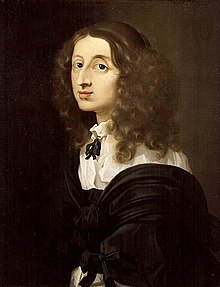Christine of Sweden
| Christina | |||||
|---|---|---|---|---|---|

Portrait by Sébastien Bourdon, who exaggerated her eyes.
|
|||||
| Queen of Sweden | |||||
| Reign | 6 November 1632 – 6 June 1654 | ||||
| Coronation | 20 October 1650 | ||||
| Predecessor | Gustav II Adolf | ||||
| Successor | Charles X Gustav | ||||
| Born | 18 December [O.S. 8 December] 1626 Tre Kronor Castle, |
||||
| Died | 19 April 1689 (aged 62) Rome, Papal States |
||||
| Burial | 22 June 1689 St. Peter's Basilica, Vatican City |
||||
|
|||||
| House | Vasa | ||||
| Father | Gustavus Adolphus of Sweden | ||||
| Mother | Maria Eleonora of Brandenburg | ||||
| Religion |
Roman Catholic prev. Lutheran |
||||
| Full name | |
|---|---|
| Christina Augusta or Christina Alexandra |
Christina (18 December [O.S. 8 December] 1626 – 19 April 1689) reigned as Queen of Sweden from 1632 to 1654. She was the only surviving legitimate child of King Gustav II Adolph and his wife Maria Eleonora of Brandenburg. At the age of six, Christina succeeded her father on the throne upon his death at the Battle of Lützen, but began ruling when she reached the age of 18.
Christina is remembered as one of the most educated women of the 1600s. She was fond of books, manuscripts, paintings, and sculptures. With her interest in religion, philosophy, mathematics and alchemy, she attracted many scientists to Stockholm, wanting the city to become the "Athens of the North". She was intelligent, fickle and moody; she rejected what the sexual role of a woman was at the time. She caused a scandal when she decided not to marry and in 1654 when she abdicated her throne and converted to Roman Catholicism. She changed her name from Kristina Augusta Wasa, adopting the name Christina Alexandra.
At the age of 28, the "Minerva of the North" moved to Rome. The Pope described Christina as "a queen without a realm, a Christian without faith, and a woman without shame". Notwithstanding all that, she became a leader of the theatrical and musical life and protected many Baroque artists, composers, and musicians.
Being the guest of five consecutive popes, and a symbol of the Counter Reformation, she is one of the few women buried in the Vatican grotto. Her unconventional lifestyle and masculine dressing and behavior have been featured in countless novels, plays, opera and film. In all the biographies on Christina her gender and cultural identity play an important role.
Christina was born in the royal castle Tre Kronor. The king had already sired two daughters – a nameless princess stillborn in 1620 and then the first princess Christina, who was born in 1623 and died the following year. Excited expectation surrounded Maria Eleonora's third pregnancy in 1626. When the baby was born it was first thought to be a boy as it was "hairy" and screamed, "with a strong, hoarse voice". She later wrote in her autobiography that, "Deep embarrassment spread among the women when they discovered their mistake". The king, though, was very happy, stating, "She'll be clever, she has made fools of us all!". From most accounts, Gustav Adolf appears to have been closely attached to his daughter, and she appears to have admired him greatly.
...
Wikipedia
